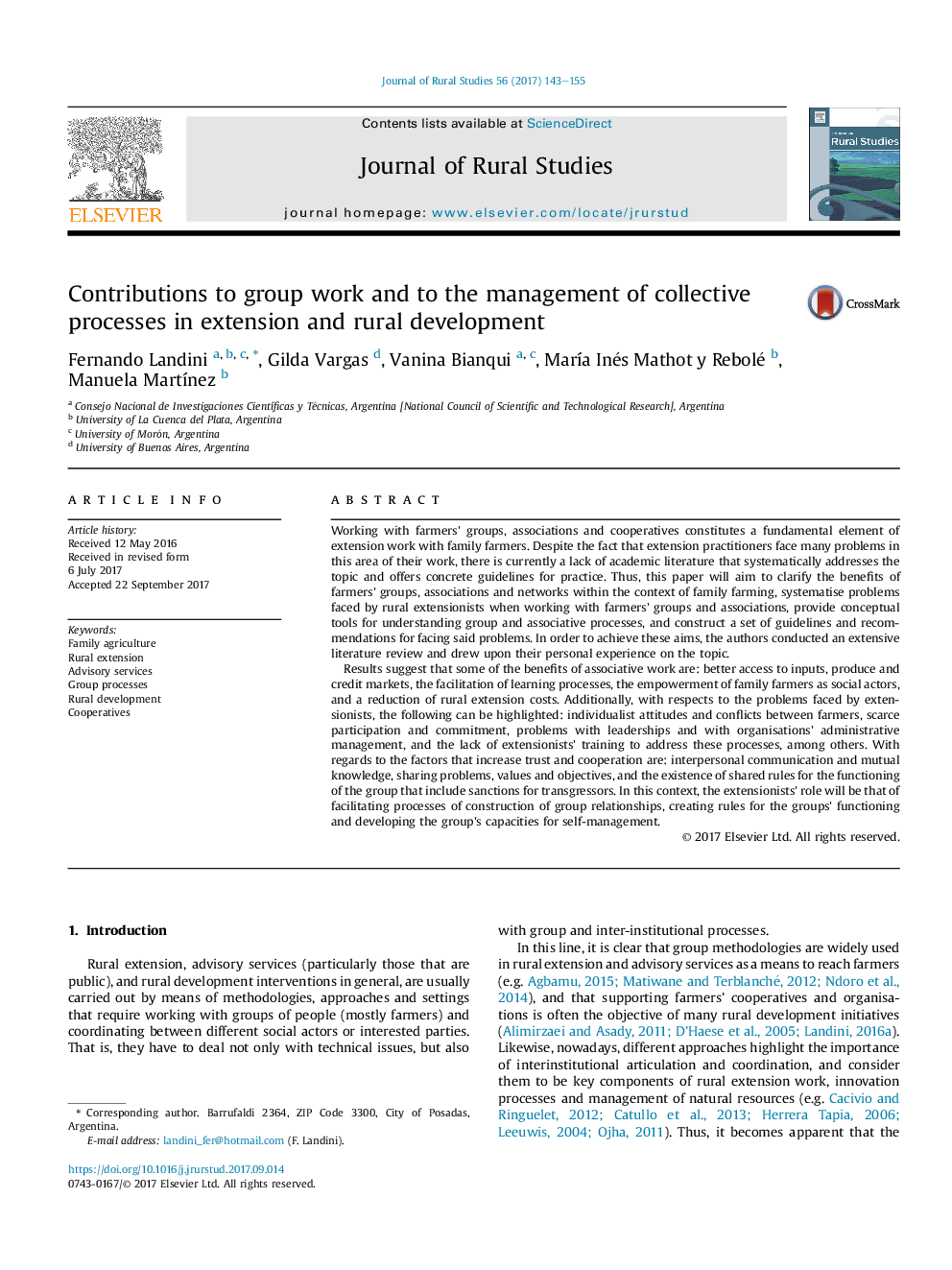| کد مقاله | کد نشریه | سال انتشار | مقاله انگلیسی | نسخه تمام متن |
|---|---|---|---|---|
| 4759929 | 1421775 | 2017 | 13 صفحه PDF | دانلود رایگان |
عنوان انگلیسی مقاله ISI
Contributions to group work and to the management of collective processes in extension and rural development
ترجمه فارسی عنوان
مشارکت در کار گروهی و مدیریت فرایندهای جمعی در توسعه و توسعه روستایی
دانلود مقاله + سفارش ترجمه
دانلود مقاله ISI انگلیسی
رایگان برای ایرانیان
کلمات کلیدی
کشاورزی خانواده، توسعه روستایی، خدمات مشاوره، فرایندهای گروه، توسعه روستایی، تعاونی ها،
ترجمه چکیده
نتایج نشان می دهد که برخی از مزایای کارهای انجمنی عبارتند از: دسترسی بهتر به ورودی ها، تولید و بازار اعتبار، تسهیل فرآیندهای یادگیری، توانمند سازی کشاورزان خانواده به عنوان بازیگران اجتماعی و کاهش هزینه های توسعه روستایی. علاوه بر این، با توجه به مشکلات مواجهه با توسعه دهندگان، می توان به موارد زیر اشاره کرد: نگرش فردی و درگیری بین کشاورزان، کمبود مشارکت و تعهد، مشکلات رهبری و مدیریت اداری سازمان ها، و عدم آموزش فراگیران برای رسیدگی به این پروسه ها ، درمیان دیگران. با توجه به عواملی که باعث افزایش اعتماد و همکاری می شوند ارتباطات بین فردی و دانش متقابل، به اشتراک گذاری مشکلات، ارزش ها و اهداف و وجود قوانین مشترک برای عملکرد گروه که شامل تحریم ها برای متخلفان است. در این زمینه، نقش توسعهدهندگان، تسهیل فرایندهای ساختن روابط گروهی، ایجاد قوانین برای عملکرد گروه و ایجاد ظرفیت گروه برای خود مدیریت است.
موضوعات مرتبط
علوم زیستی و بیوفناوری
علوم کشاورزی و بیولوژیک
جنگلداری
چکیده انگلیسی
Results suggest that some of the benefits of associative work are: better access to inputs, produce and credit markets, the facilitation of learning processes, the empowerment of family farmers as social actors, and a reduction of rural extension costs. Additionally, with respects to the problems faced by extensionists, the following can be highlighted: individualist attitudes and conflicts between farmers, scarce participation and commitment, problems with leaderships and with organisations' administrative management, and the lack of extensionists' training to address these processes, among others. With regards to the factors that increase trust and cooperation are: interpersonal communication and mutual knowledge, sharing problems, values and objectives, and the existence of shared rules for the functioning of the group that include sanctions for transgressors. In this context, the extensionists' role will be that of facilitating processes of construction of group relationships, creating rules for the groups' functioning and developing the group's capacities for self-management.
ناشر
Database: Elsevier - ScienceDirect (ساینس دایرکت)
Journal: Journal of Rural Studies - Volume 56, November 2017, Pages 143-155
Journal: Journal of Rural Studies - Volume 56, November 2017, Pages 143-155
نویسندگان
Fernando Landini, Gilda Vargas, Vanina Bianqui, MarÃa Inés Mathot y Rebolé, Manuela MartÃnez,
